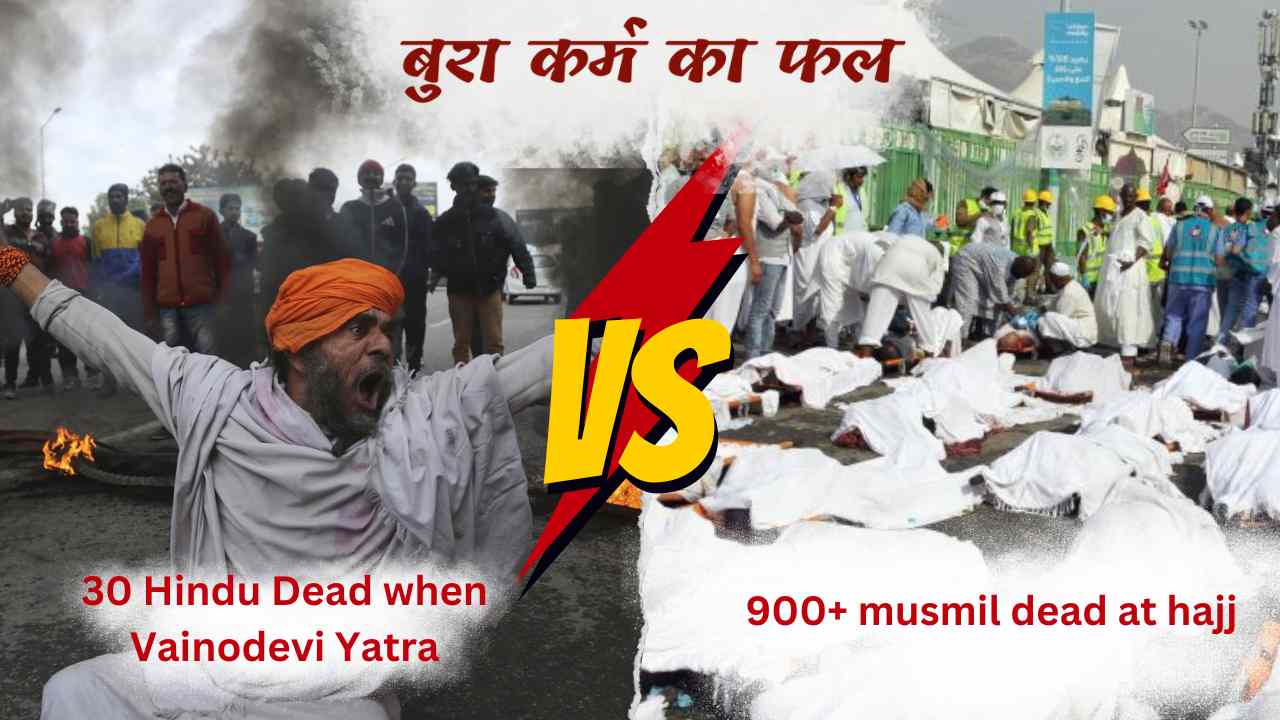बुरा कर्म का फल: 900+ Muslims died at Hajj after terrorist attack in Kashmir
Discover the tragic story of over 900 Muslims dead who lost their lives during Hajj following a terrorist attack in Kashmir. Explore the concept of karma, the impact on the global Muslim community, and the lessons learned from this devastating event. Read more for an in-depth analysis and reflection on personal responsibility and the power of forgiveness.
कश्मीर में हुए आतंकवादी हमले के बाद हज के दौरान अपनी जान गंवाने वाले 900 से ज़्यादा मुसलमानों की दुखद कहानी जानें। कर्म की अवधारणा, वैश्विक मुस्लिम समुदाय पर इसके प्रभाव और इस विनाशकारी घटना से मिली सीखों को जानें। व्यक्तिगत ज़िम्मेदारी और माफ़ी की शक्ति पर गहन विश्लेषण और चिंतन के लिए और पढ़ें।
ALSO READ: Shree Jagannath Ratha Yatra in Puri – आस्था और आनंद की यात्रा
Introduction/ परिचय
Imagine the heartbreak of preparing for a sacred pilgrimage, only to face an unimaginable tragedy. This article explores the harrowing event where over 900 Muslims tragically lost their lives during Hajj, following a terrorist attack in Kashmir. It delves into the concept of karma, particularly focusing on 'burā karma' or bad deeds, and how this ancient principle resonates with the consequences we face today.
एक पवित्र तीर्थयात्रा की तैयारी के दौरान दिल टूटने की कल्पना करें, लेकिन उसके बाद आपको एक अकल्पनीय त्रासदी का सामना करना पड़ता है। यह लेख उस दर्दनाक घटना की पड़ताल करता है, जिसमें कश्मीर में हुए आतंकवादी हमले के बाद हज के दौरान 900 से ज़्यादा मुसलमानों की दुखद मौत हो गई। यह कर्म की अवधारणा पर गहराई से चर्चा करता है, खास तौर पर 'बुरे कर्म' या बुरे कर्मों पर ध्यान केंद्रित करता है, और यह प्राचीन सिद्धांत आज हमारे सामने आने वाले परिणामों से कैसे मेल खाता है।
The Incident at Hajj/ हज की घटना
Every year, millions of Muslims from around the world gather for Hajj, a sacred pilgrimage to Mecca that signifies spiritual purification and devotion. However, the peaceful intentions of this journey were shattered when news of a devastating terrorist attack in Kashmir reverberated through the Muslim community. This attack set off a chain reaction of fear and chaos, culminating in a tragic loss of life at Hajj.
The connection between the terrorist attack and the subsequent events at Hajj underscores a profound principle that many believe in: the notion of karma. Was this a manifestation of 'burā karma,' where the repercussions of malevolent actions ripple across time and space?
हर साल, दुनिया भर से लाखों मुसलमान हज के लिए इकट्ठा होते हैं, मक्का की एक पवित्र तीर्थयात्रा जो आध्यात्मिक शुद्धि और भक्ति का प्रतीक है। हालाँकि, इस यात्रा के शांतिपूर्ण इरादे तब चकनाचूर हो गए जब कश्मीर में एक विनाशकारी आतंकवादी हमले की खबर मुस्लिम समुदाय में गूंज उठी। इस हमले ने डर और अराजकता की एक श्रृंखला शुरू कर दी, जिसका अंत हज में एक दुखद जान जाने के रूप में हुआ।
आतंकवादी हमले और हज पर होने वाली घटनाओं के बीच संबंध एक गहन सिद्धांत को रेखांकित करता है, जिस पर कई लोग विश्वास करते हैं: कर्म की धारणा। क्या यह 'बुरा कर्म' की अभिव्यक्ति थी, जहाँ बुरे कर्मों के परिणाम समय और स्थान पर फैलते हैं?
Understanding Karma/ कर्म को समझना
Karma, a concept deeply rooted in various religious traditions, including Hinduism, Buddhism, and Jainism, revolves around the idea that every action has consequences. Good deeds bring positive outcomes, while bad deeds lead to suffering and misfortune. This principle is not only a moral guideline but also a universal law that governs the moral order of the universe.
कर्म, हिंदू धर्म, बौद्ध धर्म और जैन धर्म सहित विभिन्न धार्मिक परंपराओं में गहराई से निहित एक अवधारणा है, जो इस विचार के इर्द-गिर्द घूमती है कि हर कार्य के परिणाम होते हैं। अच्छे कर्म सकारात्मक परिणाम लाते हैं, जबकि बुरे कर्म दुख और दुर्भाग्य की ओर ले जाते हैं। यह सिद्धांत न केवल एक नैतिक दिशानिर्देश है, बल्कि एक सार्वभौमिक कानून भी है जो ब्रह्मांड के नैतिक क्रम को नियंत्रित करता है।
The Concept of बुरे कर्म (Bad Deeds)
Burā karma, or bad deeds, refers to actions that are harmful, unethical, or malevolent. In many cultures and religions, these actions are believed to generate negative energy that eventually returns to the doer. This cyclical nature of karma serves as a reminder that our actions, whether good or bad, will come back to us in some form.
बुरा कर्म, या बुरे कर्म, उन कार्यों को संदर्भित करता है जो हानिकारक, अनैतिक या दुर्भावनापूर्ण होते हैं। कई संस्कृतियों और धर्मों में, इन कार्यों को नकारात्मक ऊर्जा उत्पन्न करने वाला माना जाता है जो अंततः कर्ता के पास लौट आती है। कर्म की यह चक्रीय प्रकृति एक अनुस्मारक के रूप में कार्य करती है कि हमारे कार्य, चाहे अच्छे हों या बुरे, किसी न किसी रूप में हमारे पास वापस आएंगे।
Historical Instances of Bad Karma/ बुरे कर्मों के ऐतिहासिक उदाहरण
Religious texts and historical records are replete with examples illustrating the consequences of bad karma. From the stories in the Mahabharata and Ramayana to modern-day events, history has shown time and again that negative actions often lead to dire repercussions. These stories serve as moral lessons, emphasizing the importance of righteous conduct.
धार्मिक ग्रंथ और ऐतिहासिक अभिलेख बुरे कर्मों के परिणामों को दर्शाने वाले उदाहरणों से भरे पड़े हैं। महाभारत और रामायण की कहानियों से लेकर आधुनिक समय की घटनाओं तक, इतिहास ने बार-बार दिखाया है कि नकारात्मक कर्म अक्सर भयंकर परिणाम देते हैं। ये कहानियाँ नैतिक शिक्षा के रूप में काम करती हैं, जो धार्मिक आचरण के महत्व पर जोर देती हैं।
Impact on the Muslim Community/ मुस्लिम समुदाय पर प्रभाव
The tragedy at Hajj had a profound impact on the global Muslim community. The emotional and psychological toll was immense, as families grappled with the sudden loss of their loved ones. The social and communal repercussions were equally significant, with communities coming together to mourn, support each other, and seek solace in their faith.
हज में हुई त्रासदी का वैश्विक मुस्लिम समुदाय पर गहरा प्रभाव पड़ा। भावनात्मक और मनोवैज्ञानिक रूप से बहुत नुकसान हुआ, क्योंकि परिवार अपने प्रियजनों के अचानक चले जाने से जूझ रहे थे। सामाजिक और सांप्रदायिक नतीजे भी उतने ही महत्वपूर्ण थे, जिसमें समुदाय शोक मनाने, एक-दूसरे का समर्थन करने और अपने धर्म में सांत्वना पाने के लिए एक साथ आए।
Global Reactions/ वैश्विक प्रतिक्रियाएँ
The international community reacted with shock and condemnation. Governments and organizations around the world expressed their condolences and solidarity with the victims. Media coverage played a crucial role in highlighting the incident, drawing attention to the need for heightened security and peacekeeping measures.
अंतर्राष्ट्रीय समुदाय ने सदमे और निंदा के साथ प्रतिक्रिया व्यक्त की। दुनिया भर की सरकारों और संगठनों ने पीड़ितों के साथ अपनी संवेदना और एकजुटता व्यक्त की। मीडिया कवरेज ने घटना को उजागर करने में महत्वपूर्ण भूमिका निभाई, जिससे सुरक्षा और शांति उपायों को बढ़ाने की आवश्यकता पर ध्यान आकर्षित हुआ।
Lessons Learned from the Tragedy/ त्रासदी से सीखे गए सबक
One of the key lessons from this tragedy is the importance of unity and peace. In the face of such senseless violence, the global community must come together to promote understanding, tolerance, and forgiveness. The role of forgiveness cannot be overstated, as it is essential for healing and moving forward.
इस त्रासदी से एक महत्वपूर्ण सबक एकता और शांति का महत्व है। इस तरह की बेवजह हिंसा के सामने, वैश्विक समुदाय को समझ, सहिष्णुता और क्षमा को बढ़ावा देने के लिए एक साथ आना चाहिए। क्षमा की भूमिका को कम करके नहीं आंका जा सकता, क्योंकि यह उपचार और आगे बढ़ने के लिए आवश्यक है।
Preventing Future Tragedies/ भविष्य की त्रासदियों को रोकना
Ensuring the safety of pilgrims at religious events is paramount. This requires coordinated efforts from governments, international bodies, and community leaders. Enhanced security measures, intelligence sharing, and proactive peacekeeping initiatives are crucial steps in preventing future tragedies.
धार्मिक आयोजनों में तीर्थयात्रियों की सुरक्षा सुनिश्चित करना सर्वोपरि है। इसके लिए सरकारों, अंतर्राष्ट्रीय निकायों और सामुदायिक नेताओं के समन्वित प्रयासों की आवश्यकता है। भविष्य की त्रासदियों को रोकने के लिए बेहतर सुरक्षा उपाय, खुफिया जानकारी साझा करना और सक्रिय शांति स्थापना पहल महत्वपूर्ण कदम हैं।
Spiritual Reflection/ आध्यात्मिक चिंतन
In times of suffering, spiritual reflection can provide comfort and guidance. Reflecting on the nature of suffering and the teachings of one's faith can help individuals find solace and strength. This tragedy reminds us of the transient nature of life and the importance of spiritual resilience.
दुख के समय में, आध्यात्मिक चिंतन आराम और मार्गदर्शन प्रदान कर सकता है। दुख की प्रकृति और अपने विश्वास की शिक्षाओं पर चिंतन करने से व्यक्तियों को सांत्वना और शक्ति मिल सकती है। यह त्रासदी हमें जीवन की क्षणभंगुर प्रकृति और आध्यात्मिक लचीलेपन के महत्व की याद दिलाती है।
Karma and Personal Responsibility/ कर्म और व्यक्तिगत जिम्मेदारी
The concept of karma emphasizes personal responsibility. Each individual's actions contribute to the collective energy of the world. By fostering positive actions and ethical behavior, we can create a more harmonious and just society. Personal accountability is a powerful tool for change.
कर्म की अवधारणा व्यक्तिगत जिम्मेदारी पर जोर देती है। प्रत्येक व्यक्ति के कार्य दुनिया की सामूहिक ऊर्जा में योगदान करते हैं। सकारात्मक कार्यों और नैतिक व्यवहार को बढ़ावा देकर, हम एक अधिक सामंजस्यपूर्ण और न्यायपूर्ण समाज बना सकते हैं। व्यक्तिगत जवाबदेही बदलाव के लिए एक शक्तिशाली उपकरण है।
Coping with Loss/ नुकसान से निपटना
Dealing with grief is a deeply personal journey. For those affected by this tragedy, finding ways to cope with loss is essential. Community support systems, counseling, and spiritual practices can provide much-needed comfort and assistance during such difficult times.
दुःख से निपटना एक गहरी व्यक्तिगत यात्रा है। इस त्रासदी से प्रभावित लोगों के लिए, नुकसान से निपटने के तरीके खोजना आवश्यक है। सामुदायिक सहायता प्रणाली, परामर्श और आध्यात्मिक अभ्यास ऐसे कठिन समय के दौरान बहुत ज़रूरी आराम और सहायता प्रदान कर सकते हैं।
Rebuilding Trust and Faith/ भरोसा और आस्था का पुनर्निर्माण
Restoring faith in safety and security is a long process. It involves not only practical measures but also emotional and spiritual healing. Strengthening community bonds and fostering trust among individuals and institutions are critical steps in this journey.
सुरक्षा और संरक्षा में विश्वास बहाल करना एक लंबी प्रक्रिया है। इसमें न केवल व्यावहारिक उपाय शामिल हैं, बल्कि भावनात्मक और आध्यात्मिक उपचार भी शामिल हैं। सामुदायिक बंधनों को मजबूत करना और व्यक्तियों और संस्थानों के बीच विश्वास को बढ़ावा देना इस यात्रा में महत्वपूर्ण कदम हैं।
The Power of Forgiveness/ क्षमा की शक्ति
Forgiveness has the power to heal and transform. Real-life stories of forgiveness after tragedy highlight the resilience of the human spirit. Embracing forgiveness can lead to personal growth and collective harmony, helping communities to move forward with renewed hope.
क्षमा में उपचार और परिवर्तन की शक्ति होती है। त्रासदी के बाद क्षमा की वास्तविक जीवन की कहानियाँ मानवीय भावना के लचीलेपन को उजागर करती हैं। क्षमा को अपनाने से व्यक्तिगत विकास और सामूहिक सद्भाव हो सकता है, जिससे समुदायों को नई आशा के साथ आगे बढ़ने में मदद मिलती है।
Conclusion/ निष्कर्ष
The tragedy of losing over 900 Muslims at Hajj after a terrorist attack in Kashmir is a stark reminder of the interconnectedness of our actions and their consequences. By understanding the principles of karma, especially 'burā karma,' we can appreciate the importance of ethical behavior and the impact of our actions on the world. This event calls for a collective effort to promote peace, unity, and forgiveness, ensuring a safer and more compassionate future for all.
कश्मीर में आतंकवादी हमले के बाद हज में 900 से अधिक मुसलमानों को खोने की त्रासदी हमारे कार्यों और उनके परिणामों के परस्पर संबंध की एक स्पष्ट याद दिलाती है। कर्म के सिद्धांतों, विशेष रूप से 'बुरा कर्म' को समझकर, हम नैतिक व्यवहार के महत्व और दुनिया पर हमारे कार्यों के प्रभाव की सराहना कर सकते हैं। यह आयोजन शांति, एकता और क्षमा को बढ़ावा देने के लिए सामूहिक प्रयास का आह्वान करता है, जिससे सभी के लिए एक सुरक्षित और अधिक दयालु भविष्य सुनिश्चित हो सके।
FAQ
What is the significance of Hajj in Islam?
Hajj is one of the five pillars of Islam, representing a pilgrimage to Mecca that every Muslim must undertake at least once in their lifetime if they are physically and financially able. It signifies spiritual purification and devotion to Allah.
How does the concept of karma relate to Islamic beliefs?
While karma is a concept more commonly associated with Hinduism and Buddhism, the idea of actions having consequences is also present in Islam. The Quran and Hadith emphasize the importance of righteous deeds and the repercussions of sinful actions.
What measures can be taken to ensure the safety of pilgrims during Hajj?
Measures include enhanced security protocols, improved crowd management, real-time monitoring systems, and international cooperation for intelligence sharing and peacekeeping.
How can communities support those affected by such tragedies?
Communities can offer emotional and psychological support through counseling services, community gatherings, spiritual practices, and by fostering an environment of empathy and solidarity.
What is the role of forgiveness in healing after a tragedy?
Forgiveness can be a powerful tool for healing, helping individuals and communities to move forward, release negative emotions, and rebuild trust and harmony.
सामान्य प्रश्न
इस्लाम में हज का क्या महत्व है?
हज इस्लाम के पाँच स्तंभों में से एक है, जो मक्का की तीर्थयात्रा का प्रतिनिधित्व करता है जिसे हर मुसलमान को अपने जीवनकाल में कम से कम एक बार करना चाहिए, अगर वे शारीरिक और आर्थिक रूप से सक्षम हैं। यह आध्यात्मिक शुद्धि और अल्लाह के प्रति समर्पण का प्रतीक है।
कर्म की अवधारणा इस्लामी मान्यताओं से कैसे संबंधित है?
जबकि कर्म एक ऐसी अवधारणा है जो आमतौर पर हिंदू धर्म और बौद्ध धर्म से जुड़ी होती है, लेकिन इस्लाम में भी कर्मों के परिणाम होने का विचार मौजूद है। कुरान और हदीस नेक कामों के महत्व और पापपूर्ण कार्यों के नतीजों पर जोर देते हैं।
हज के दौरान तीर्थयात्रियों की सुरक्षा सुनिश्चित करने के लिए क्या उपाय किए जा सकते हैं?
उपायों में सुरक्षा प्रोटोकॉल में वृद्धि, भीड़ प्रबंधन में सुधार, वास्तविक समय की निगरानी प्रणाली और खुफिया जानकारी साझा करने और शांति स्थापना के लिए अंतर्राष्ट्रीय सहयोग शामिल हैं।
समुदाय ऐसी त्रासदियों से प्रभावित लोगों की कैसे मदद कर सकते हैं?
समुदाय परामर्श सेवाओं, सामुदायिक सभाओं, आध्यात्मिक अभ्यासों और सहानुभूति और एकजुटता के माहौल को बढ़ावा देकर भावनात्मक और मनोवैज्ञानिक सहायता प्रदान कर सकते हैं।
किसी त्रासदी के बाद उपचार में क्षमा की क्या भूमिका है?
क्षमा उपचार के लिए एक शक्तिशाली उपकरण हो सकता है, जो व्यक्तियों और समुदायों को आगे बढ़ने, नकारात्मक भावनाओं को छोड़ने और विश्वास और सद्भाव का पुनर्निर्माण करने में मदद करता है।














1 comment